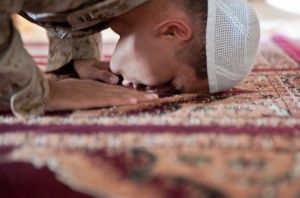Originally posted 2020-05-26 01:41:35.

What is there after Ramadan? Do the lessons of Ramadan end with it, or continue after it? The article replies.
By Dr. Main Al-Qudah
Yesterday, Muslims were waiting for Ramadan, however, today they are saying goodbye to it, as if this month were moments long. And as this month passed quickly, life does, and so people die and move to the hereafter.
The end of Ramadan reminds us with the closeness of death. The end of Ramadan reminds us with the saying of the prophet (peace be upon him), “Live in this world like a stranger or a bye-passer”. Ibn Omar used to say, “If you wake up, don’t wait for the evening, and if you reach the evening, don’t wait for the morning. Take advantage of your good health and your life”. (Al-Bukhari)
The end of Ramadan reminds us with the saying of Prophet Nuh (Noah, peace be upon him), who lived more than thousand years. When death came to him, he was asked about life, he said, “My example with life is just like a person enters a house that has two doors, he enters from one, and gets out from the other”. The prophet Muhammad (peace be upon him) also said, “My example in this life is just like a traveler who takes shelter under a tree and then leaves it and goes”. (At-Tirmidhi)
While saying goodbye to Ramadan, each one of us should ask himself these questions: What have I gained from this month? Have I passed the test? Do I deserve to get the diploma of taqwa (righteousness)? Whoever finds goodness then let him praise Allah and whoever finds something else let him work hard to reform himself and seek the help from Allah.
What is there after Ramadan? Do the lessons of Ramadan end with it, or continue after it?
To answer this question, we shall briefly go over these lessons:
Fasting
We’ve learned from fasting how to soften our souls and break their desires and performing the concept of Ubudiyah (servitude) to Allah alone. The prophet encouraged us to continue fasting six days during the month of Shawwal when he said, “Whoever fasts the month of Ramadan and he follows it with six days of Shawwal as if he fast the whole year”. (Muslim) It was the tradition of the Prophet to fast Mondays, Thursdays, three days of each lunar moth, the day of `Arafah, `Aashura’ and most of Sha`ban and Muharram.
Praying Tarawih
Praying at night was the habit of the Prophet (peace be upon him) all his life, and he used to encourage his followers to do so. He (peace be upon him) said, “Do the night prayer; it used to be the good deeds of the pious people before you. It draws you closer to your Lord, it causes your sins to be forgiven, and it causes you to avoid doing bad deeds”. (Al-Hakim) Allah describes his pious servants that “they used to sleep a little at night” in Surat As-Sajdah.
The recitation of the Quran
You must not stop reading the Qur’an after Ramadan, otherwise you’ll be among those whom the prophet (peace be upon him) described as Allah says,
And the messenger said, ‘O my Lord! Verily my people have deserted this Quran. (Al-Furqan 25:30)
And remember the advice of the Prophet (peace be upon him) when he said, “Read the Quran repeatedly, for the reason that it is easier to be released from the chests of men than the camel from its leash”. (Al-Bukhari and Muslim) So, open your heart to the orders and advices of Allah, and make sure that your wife and children learn how to read correctly the book of Allah.
Charity
Allah (Glory be to Him) says,
Those who spend their wealth day and night, secretly and publicly, their reward is with their lord… (Al-Baqarah 2:274)
The Prophet was very generous, like wind loaded with rain. Remember that Allah will compensate you for what you spend, and that spending is a sign of having faith in Him. Remember that the reward of spending for the sake of Allah in non-Muslim countries is anticipated to be doubled since the need for it is urgent for building and maintaining Masajids, schools and other institutes for Muslims. Spending from your wealth will benefit you in your life and in the hereafter. The messenger of Allah (peace be upon him) said, “When the son of Adam dies, his deeds will be terminated except in case of one of these three: a continual charity, or a beneficial knowledge, or a pious son who prays for his father.” (Muslim)
Abandoning the Evil
Abandoning the evil and committing sins are obligatory in Ramadan and outside Ramadan. It is the deed of the people of true faith. There is no goodness in a Muslim who doesn’t do evil in Ramadan but as soon as Ramadan ends, he goes back to his evil deeds.
Knowing that Eid is an excellent chance to wash the hearts from hatred and bad feeling, the Prophet (peace be upon him) says, “It’s not allowed for a Muslim to avoid his brother over three nights. They both meet, but this turns away and that turns away, and the best of them is the one who initiates Salam.” (Al-Bukhari and Muslim) So, be better than your brother and initiate the Salam.
_____________________
Source: Amjaonline.org

